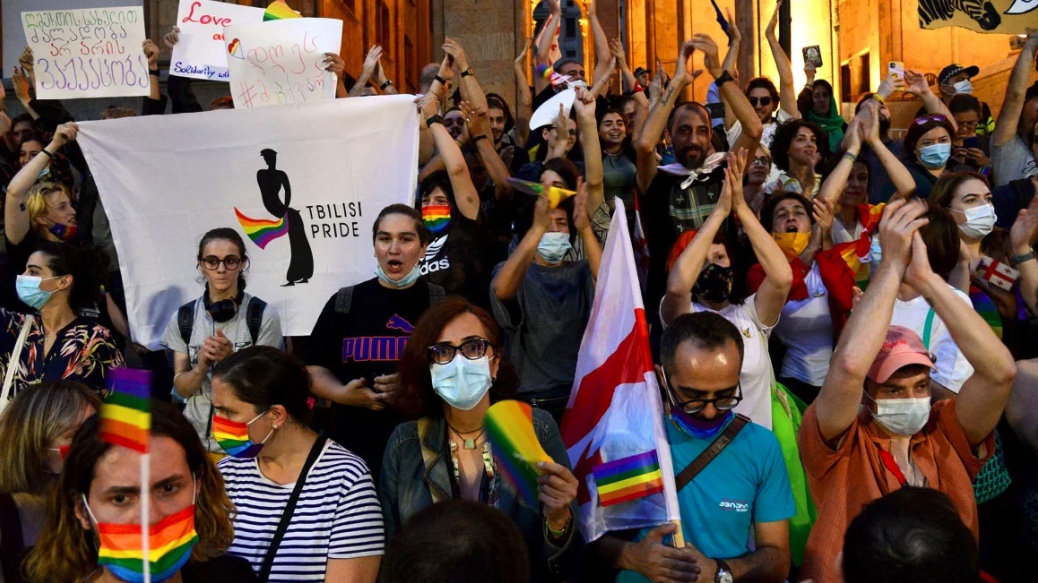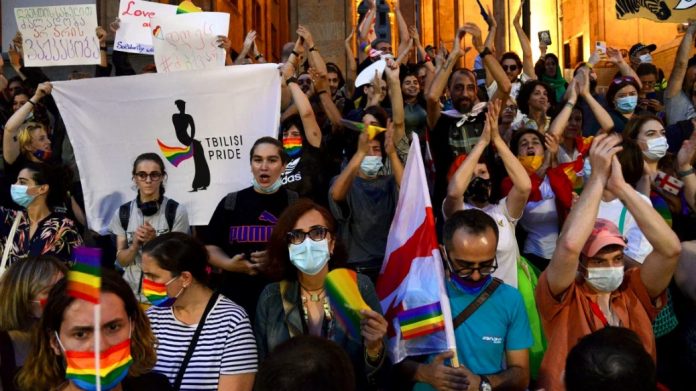เมื่อวันอังคาร สมาชิกสภานิติบัญญัติของจอร์เจียได้อนุมัติการพิจารณาอ่านกฎหมายครั้งที่สามและครั้งสุดท้ายเกี่ยวกับ “ค่านิยมครอบครัวและการคุ้มครองเยาวชน” ซึ่งจะจำกัดสิทธิของ LGBTQ อย่างกว้างขวาง
ร่างกฎหมายนี้จะให้ฐานทางกฎหมายแก่เจ้าหน้าที่ในการห้ามจัดงาน Pride และห้ามแสดงธงสีรุ้งของ LGBTQ ในที่สาธารณะ รวมถึงการเซ็นเซอร์ภาพยนตร์และหนังสือ
ผู้นำพรรคจอร์เจียนดรีมที่ปกครองอยู่กล่าวว่าจำเป็นต้องมีกฎหมายนี้เพื่อปกป้องมาตรฐานทางศีลธรรมแบบดั้งเดิมในจอร์เจีย ซึ่งคริสตจักรออร์โธดอกซ์ที่มีแนวคิดอนุรักษ์นิยมอย่างเข้มงวดมีอิทธิพลอย่างสูง
นักเคลื่อนไหวกล่าวว่ากฎหมายนี้มุ่งหวังที่จะสร้างฐานสนับสนุนแนวอนุรักษ์นิยมให้กับรัฐบาล ก่อนการเลือกตั้งสมาชิกรัฐสภาในวันที่ 26 ตุลาคม ในประเทศจอร์เจียซึ่งมีความปรารถนาที่จะเข้าร่วมสหภาพยุโรป แต่รัฐบาลตะวันตกเกรงว่าจอร์เจียกำลังเอนเอียงกลับไปทางรัสเซีย
ทามารา จาเกลี ผู้อำนวยการกลุ่มรณรงค์ Tbilisi Pride กล่าวว่า ร่างกฎหมายนี้ซึ่งยังย้ำถึงการห้ามการแต่งงานระหว่างเพศเดียวกันที่มีอยู่แล้ว และห้ามการผ่าตัดแปลงเพศ อาจบังคับให้กลุ่มของเธอต้องปิดตัวลง
“กฎหมายนี้เป็นสิ่งที่เลวร้ายที่สุดที่เกิดขึ้นกับชุมชน LGBTQ ในจอร์เจีย” จาเกลี วัย 28 ปีกล่าวกับสำนักข่าวรอยเตอร์ “พวกเราน่าจะต้องปิดตัวลง ไม่มีทางที่เราจะดำเนินงานต่อไปได้”
ประธานาธิบดีซาโลเม ซูราบิชวิลี ของจอร์เจีย ซึ่งวิจารณ์พรรคจอร์เจียนดรีมแต่มีอำนาจส่วนใหญ่เป็นเพียงในเชิงสัญลักษณ์ ได้บอกเป็นนัยว่าเธอจะคัดค้านร่างกฎหมายนี้ แต่พรรคจอร์เจียนดรีมและพันธมิตรของพวกเขามีที่นั่งเพียงพอในรัฐสภาที่จะล้มล้างการยับยั้งของเธอได้
สิทธิ LGBTQ เป็นประเด็นที่ถกเถียงกันมากในจอร์เจีย ซึ่งผลสำรวจแสดงให้เห็นว่ามีการไม่ยอมรับความสัมพันธ์ของเพศเดียวกันอย่างกว้างขวาง และรัฐธรรมนูญยังห้ามการแต่งงานของเพศเดียวกัน ผู้เข้าร่วมการเดินขบวน Pride ประจำปีในทบิลิซีเคยถูกโจมตีทางกายภาพจากผู้ประท้วงต่อต้าน LGBTQ ในช่วงหลายปีที่ผ่านมา
ตัวแทนต่างชาติ
ประเด็นนี้ได้รับความสนใจมากขึ้นก่อนการเลือกตั้งในเดือนตุลาคม ซึ่งพรรคจอร์เจียนดรีมกำลังมุ่งหวังที่จะได้รับเลือกให้ดำรงตำแหน่งสมัยที่สี่ และกำลังรณรงค์ต่อต้านสิทธิ LGBTQ อย่างหนัก
พรรครัฐบาลซึ่งผู้สมัครระดับสูงสำหรับการเลือกตั้งครั้งนี้คืออดีตนายกรัฐมนตรีมหาเศรษฐี บิดซินา อิวานิชวิลี ได้กระชับความสัมพันธ์กับประเทศรัสเซียที่อยู่ใกล้เคียง ในขณะที่ความสัมพันธ์กับประเทศตะวันตกมีแนวโน้มแย่ลง
เมื่อต้นปีนี้ รัฐบาลได้ผ่านกฎหมายว่าด้วย “ตัวแทนต่างชาติ” ซึ่งผู้วิจารณ์จากยุโรปและสหรัฐฯ กล่าวว่าเป็นเผด็จการและได้รับแรงบันดาลใจจากรัสเซีย การผ่านกฎหมายนี้ทำให้เกิดการประท้วงที่ใหญ่ที่สุดครั้งหนึ่งในจอร์เจียนับตั้งแต่ได้รับเอกราชจากสหภาพโซเวียตในปี 1991
ผลสำรวจความคิดเห็นแสดงให้เห็นว่าพรรคนี้ ซึ่งในปี 2014 เคยผ่านกฎหมายห้ามการเลือกปฏิบัติต่อ LGBTQ ก่อนจะเปลี่ยนมาสนับสนุนแนวคิดอนุรักษ์นิยมมากขึ้น ยังคงเป็นพรรคที่ได้รับความนิยมมากที่สุดในจอร์เจีย แม้จะสูญเสียฐานเสียงไปบ้างตั้งแต่ปี 2020 เมื่อพวกเขาชนะเสียงข้างมากในรัฐสภาอย่างฉิวเฉียด
ในโฆษณาหนึ่งของพรรคการเมืองที่ออกอากาศทางโทรทัศน์จอร์เจีย ใบหน้าของผู้อำนวยการ Pride จาเกลี ปรากฏเคียงข้างคำว่า “ไม่เอาการเสื่อมทรามทางศีลธรรม”
จาเกลีกล่าวว่าร่างกฎหมายนี้จะหยุดได้ก็ต่อเมื่อพรรคจอร์เจียนดรีมสูญเสียอำนาจในเดือนตุลาคม แม้ว่าเธอจะยอมรับว่าพรรคฝ่ายค้านของประเทศไม่ได้สนับสนุนสิทธิ LGBTQ อย่างชัดเจน
“วิธีเดียวที่เราจะอยู่รอดในประเทศนี้และมีความก้าวหน้าใด ๆ เกี่ยวกับสิทธิ LGBTQ ได้ คือเราต้องออกไปลงคะแนนเสียงจำนวนมากในการเลือกตั้งและลงคะแนนเพื่อการเปลี่ยนแปลง” เธอกล่าว
Georgian parliament approves law curbing LGBTQ rights

Georgian lawmakers on Tuesday approved the third and final reading of a law on “family values and the protection of minors” that would impose sweeping curbs on LGBTQ rights.
The bill would provide a legal basis for authorities to outlaw Pride events and public displays of the LGBTQ rainbow flag, and to impose censorship of films and books.
Leaders of the governing Georgian Dream party say it is needed to safeguard traditional moral standards in Georgia, whose deeply conservative Orthodox Church is highly influential.
Activists say the measure is aimed at boosting conservative support for the government ahead of a parliamentary election on October 26 in Georgia, a country that has ambitions to join the European Union but which Western governments fear is now tilting back towards Russia.
Tamara Jakeli, director of campaign group Tbilisi Pride, said the bill, which also restates an existing ban on same-sex marriage and bans gender reassignment surgery, would likely force her organisation to close its doors.
“This law is the most terrible thing to happen to the LGBTQ community in Georgia,” Jakeli, 28, told Reuters. “We will most likely have to shut down. There is no way for us to continue functioning.”
Georgian President Salome Zourabichvili, a critic of Georgian Dream whose powers are mostly ceremonial, has indicated that she will block the bill. But Georgian Dream and its allies have enough seats in parliament to override her veto.
LGBTQ rights are a fraught topic in Georgia, where polls show broad disapproval of same-sex relationships, and the constitution bans same-sex marriage. Participants in Tbilisi’s annual Pride marches have come under physical attack by anti-LGBTQ protesters in recent years.
Foreign agents
The issue has become more prominent ahead of October’s election, where Georgian Dream is seeking a fourth term in office and is campaigning heavily against LGBTQ rights.
The ruling party, whose top candidate for the election is billionaire ex-prime minister Bidzina Ivanishvili, has deepened ties with neighbouring Russia as relations with Western countries have soured.
Earlier this year, it passed a law on “foreign agents” that the European and U.S. critics said is authoritarian and Russian-inspired. Its passage sparked some of the largest protests Georgia has seen since independence from the Soviet Union in 1991.
Opinion polls show the party, which in 2014 passed a law banning anti-LGBTQ discrimination before later pivoting to more conservative positions, remains Georgia’s most popular, though it has lost ground since 2020, when it won a narrow majority in parliament.
In one ruling party advert aired on Georgian television, Pride director Jakeli’s face is shown alongside the words: “No to moral degradation”.
Jakeli said that the bill could only be stopped if Georgian Dream were to lose power in October, though she noted that the country’s opposition parties are not overtly supportive of LGBTQ rights.
“The only way we can survive in this country and have any progress on LGBTQ rights is for us to go in great numbers to the elections and vote for change,” she said.
Story by Reuters

















